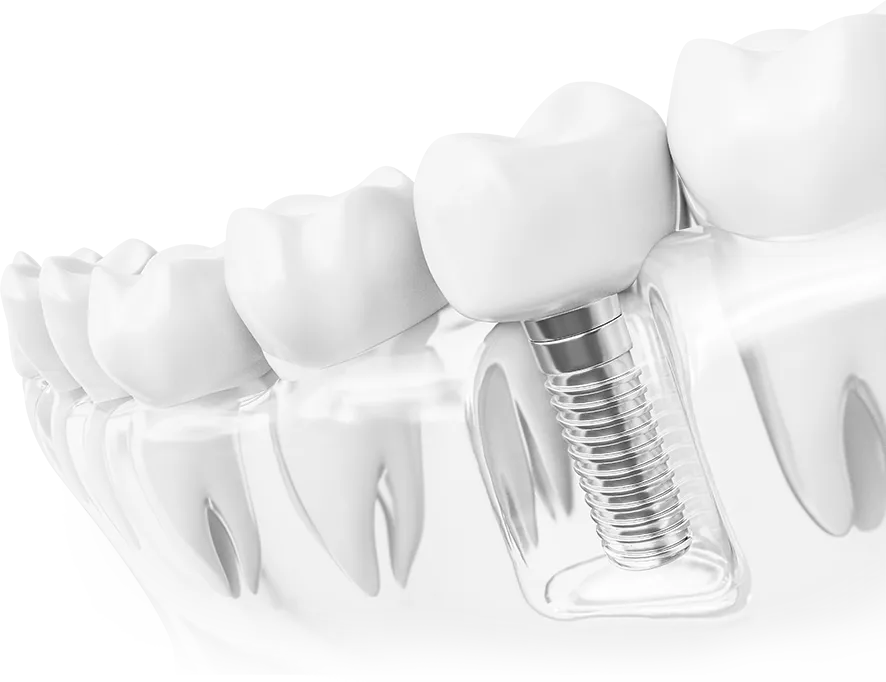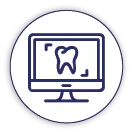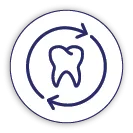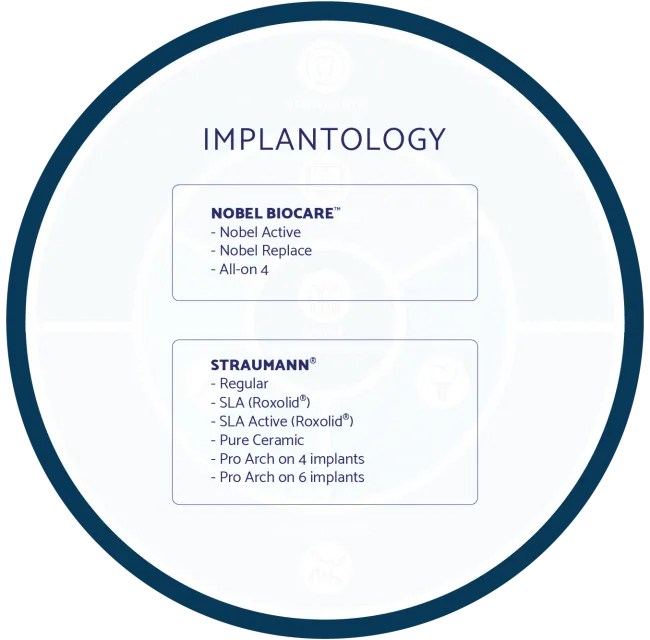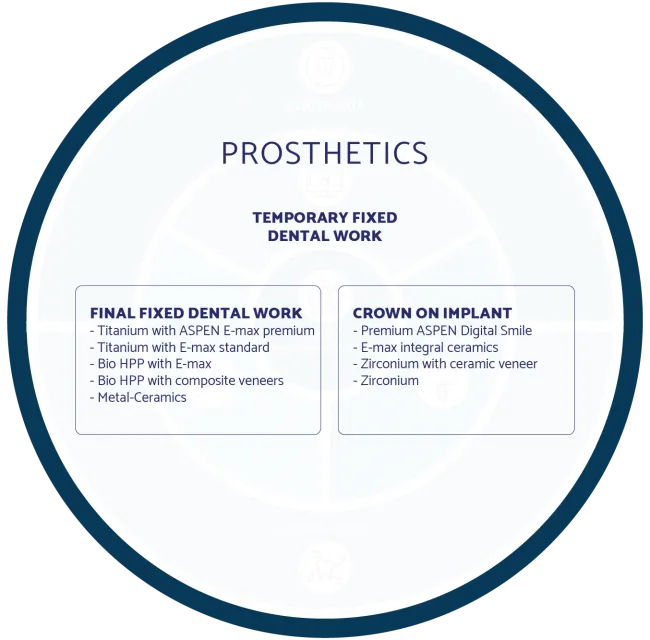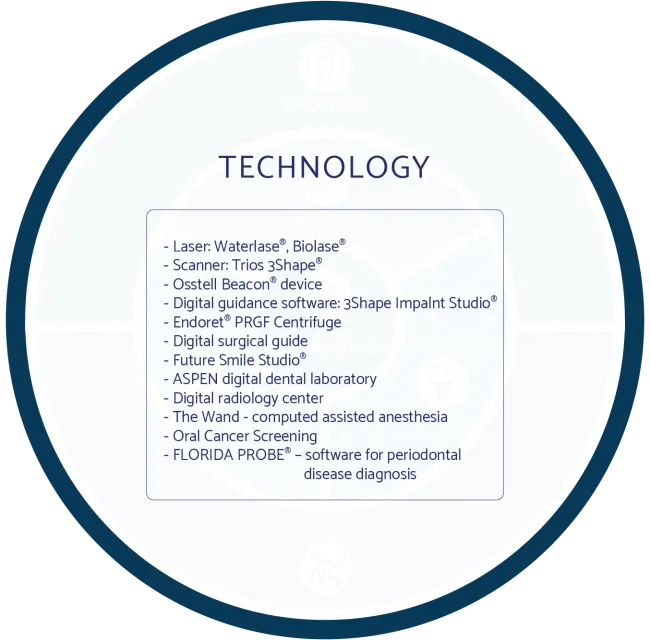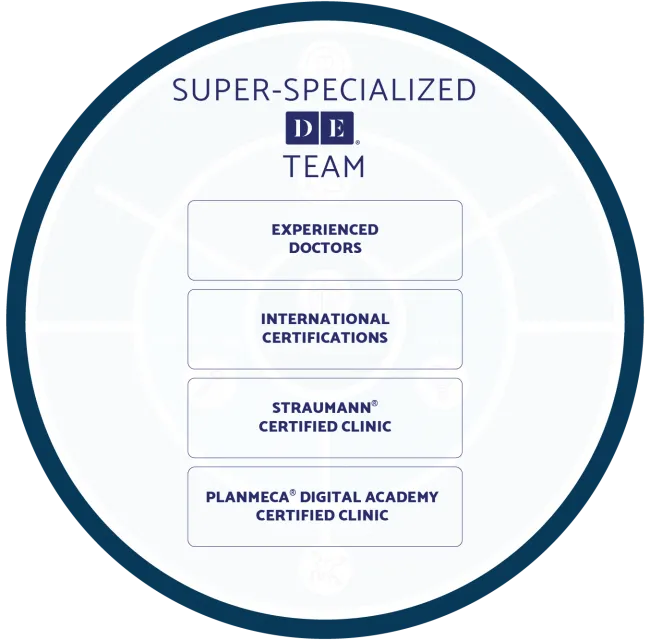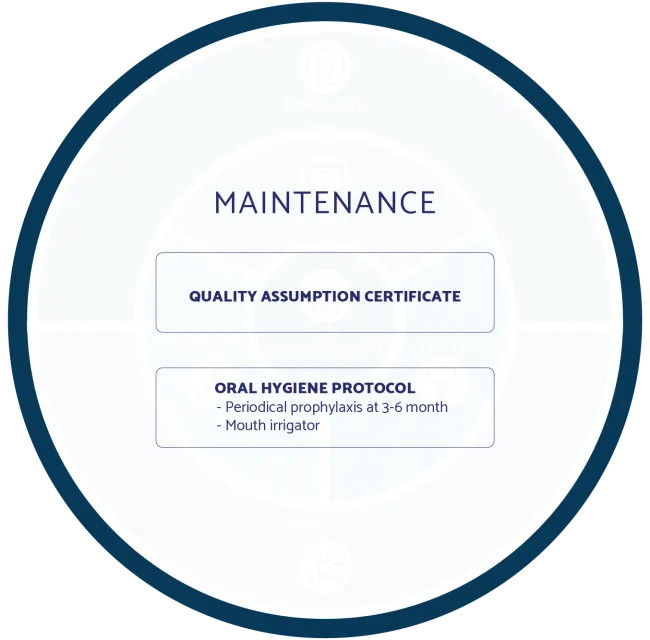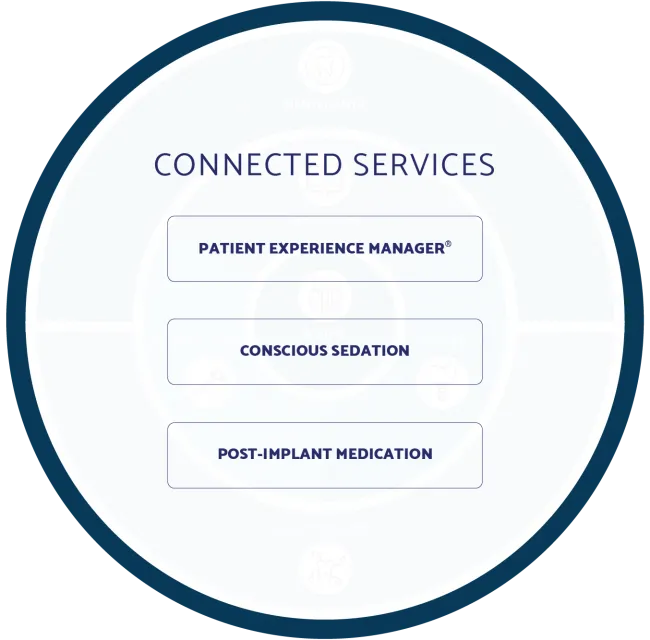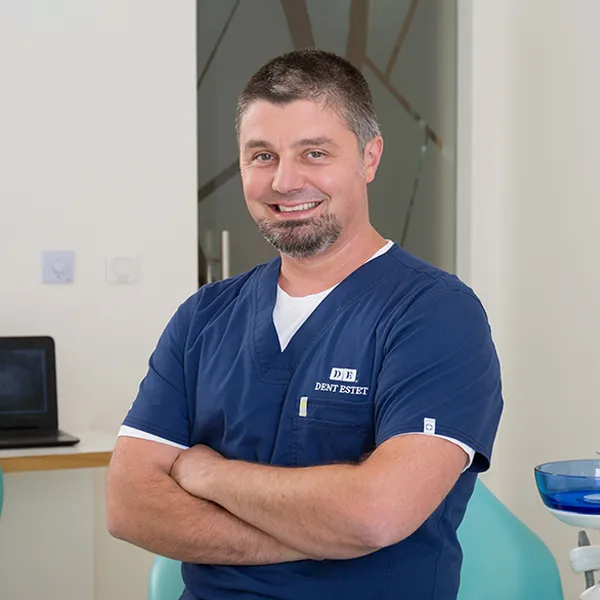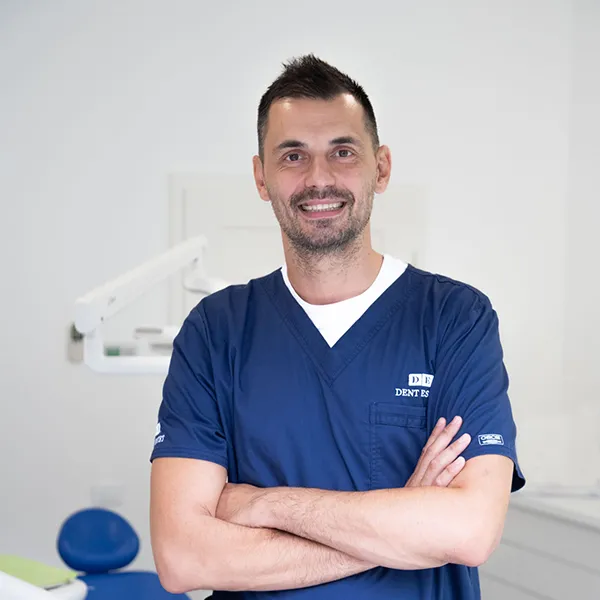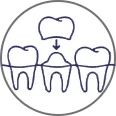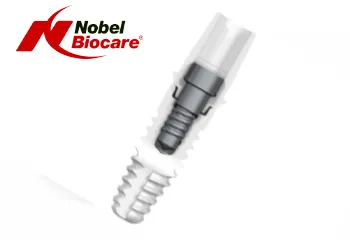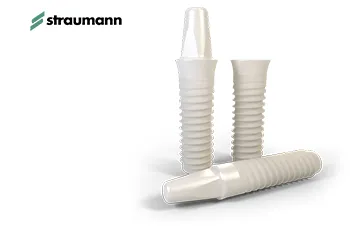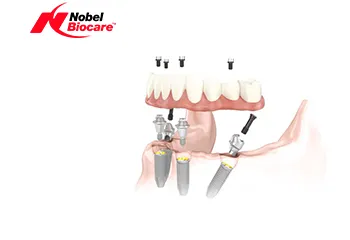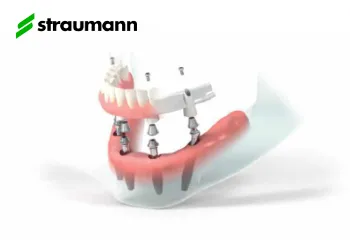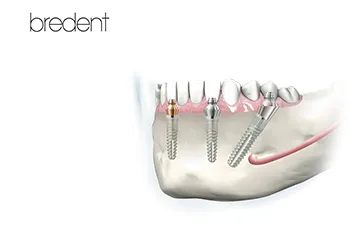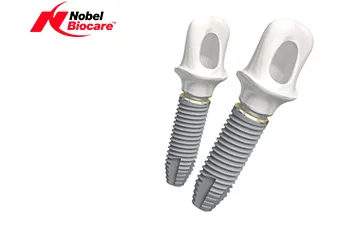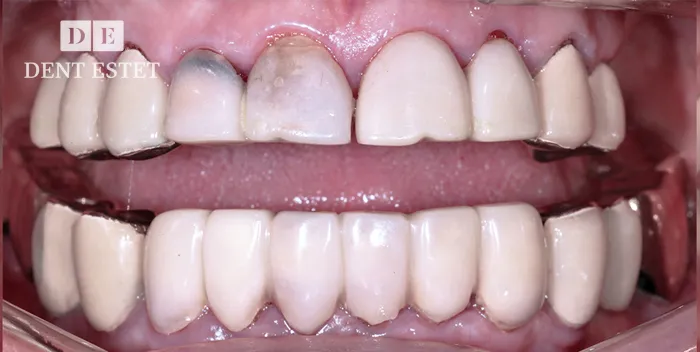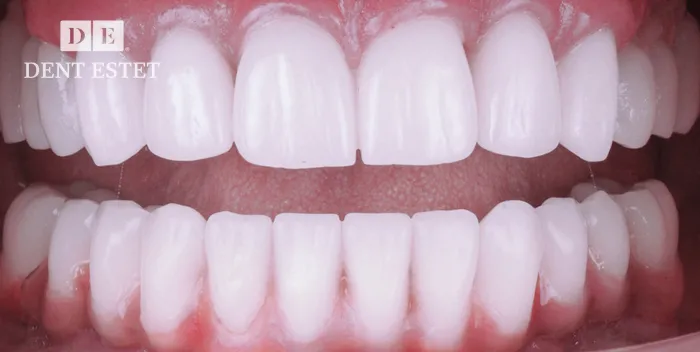The functional and emotional effects of tooth loss
The loss of one or more teeth has a particular impact on the quality of life, affecting not only the functionality and the smile asthetics, but also the physical and mental health.
Dental implants change the way we live: designed as a basic structure to replace a missing tooth, which with the final dental crown prosthetic work looks, feels and function like the natural tooth.
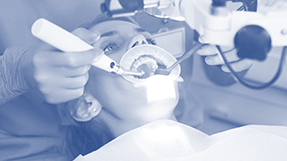
After the treatment with dental implants, the patient restores the masticatory function and regains the face harmony and the aesthetic of the smile.
What is a dental implant?
The treatment with dental implant represents the most modern method of replacing the missing teeth or that are in an advanced state of deterioration and cannot be saved.
Maintaining the long term integrity and the fact that it takes the functions and the characteristics of the natural tooth, make the dental implant the most recommended solution by the dentists all over the world.
Worldwide, the success rate of dental implant is over 98%, transforming it in a lifetime treatment solution. (According to the US National Library of Medicine National Institutes of Health)
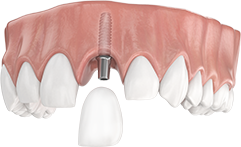
In our country, 7 out of 10 Romanians have at least one missing tooth and 93% of the patients that have chosen dental implants for their oral rehabilitation and satisfied with their choice (accordingly to a market study led by DENT ESTET and the 360insights research agency).

"Ceramic dental implants, latest premium solutions in dental implantology, represent the ideal fusion between aesthetics and biocompatibility, with natural adaptation to the biological material of the patient!"
The benefits of dental implant
Improves dental and general health
- Dental implants prevent bone resorbtion. The natural atrophy of the alveolar bone starts when the tooth is lost, and if it's not acted upon immediately, it brings complications that can led to the loss of the neighboring teeth. Statistically, the bone volume decreases by 50% in the first three years from the dental extraction, which make the following interventions more complex.
- Dental implants look and work like natural teeth. Once inserted in the bone, these osseointegrate to prevent the loss of bone mass and to maintain the harmony of the face and the health of the soft tissues
- improves the general health of the body. With strong and functional teeth, patients can return to a healthy and normal diet.
It is a reliable solution
- Dental implants osseointegrate in 1-3 months from the intervention, so that they fusion with the bone, preventing the risk of mobilizing.
- With an adequate oral care, dental implants can last for a lifetime, being considered as the smartest investment when talking about replacing missing teeth.
- The success rate of the treatment with dental implants is over 98% - depending on the implant quality and the case complexity.
Restores the confidence of the smile
-
The complete dental work consisting of the implant and the final prosthesis has a facelifting effect: it corrects the asymmetries of the face and gives the face a rejuvenated appearance (especially in patients with multiple edentations, with an aged facial appearance).
-
It boosts the self esteem and help maintain an optimum oral health state.
-
Your implants are unique. Every new tooth (permanent dental crown) is personalized with the shape, form and dimension similar to the natural teeth in order to bring back the natural look of the smile.
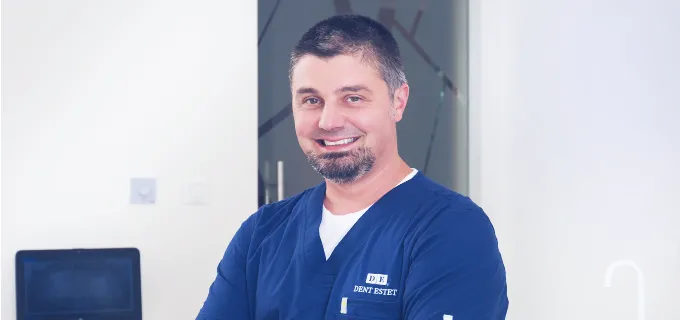
„We choose Nobel implant for its premium quality, but also for the benefits offered for single implants or for All-on-4 systems. Nobel Biocare dental implant offers more than a smile, it is actually the chance to a new life. It's a choice that offers safety and international validation through scientific studies published in certified jurnals.”
Dental implant vs. other treatment options
Since its launch in 1952 and until now, the dental implant has been perfected so that it has become the first choice of specialists for the replacement of missing teeth.
In addition to the dental implant, there are also temporary treatment solutions, less expensive, but with undesirable implications on the long-term dental health:
- Dental bridge is the traditional solution that involves replacing the missing tooth with a dental work that is supported on neighboring teeth. The prosthetic work consisting of the 3 crowns involves the grinding of the 2 healthy teeth on which it is fixed.
- Mobilizable denture is a mobile prosthetic work that rests on the gums to replace missing teeth. This can be done for the entire arch or partially for a few teeth.
This accentuates bone resorption, and then an operation with dental implants becomes a complex case.
Below you can find a table comparing the 3 types of treatments for missing teeth:
When is dental implant recommended
If you have lost at least one tooth or if you have a tooth that cannot be saved by using any conservative treatment, the first recommendation of the dentist will be dental implant.
It is very important for you to take the decision on time to prevent bone loss, teeth migration and other negative effects that can influence your oral health, facial look and the quality of life.
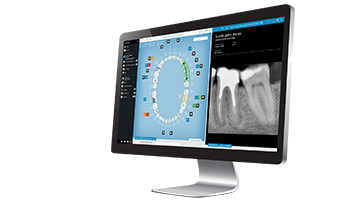
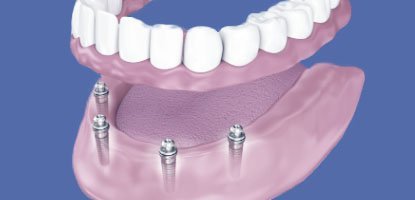
Full mouth dental implants
Patients that need to replace a dental arch or both arches with a new set of teeth can opt for fixed prosthesis systems, with temporary dental work within 24 hours.
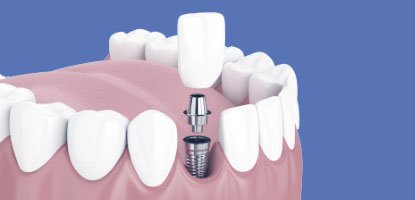
Multiple dental implant
In many cases, the patient is missing more teeth, or he can lose them due to the extended degree of deterioration, but the gums and the soft tissues remain healthy. In order to maintain the integrity of the neighboring teeth, the implantology dentist will choose a multiple dental implant solution.
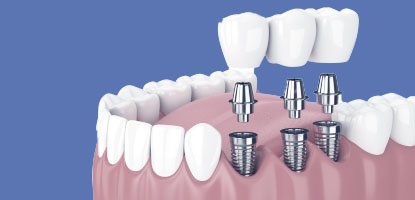
Single dental implant
In case of tooth loss due to an advanced decay, an accident or periodontal disease, that tooth can be replaced with dental implant that looks and feels like a natural tooth.

„With a modern design, the Bredent implant has an excellent primary stability, fact that make it suitable both for the cases in which we replace one tooth, but also for complex and complete dental arch oral rehabilitation. It is a reliable solution for immediate restauration and implantation, so that the masticatory function can be regained in only one day. ”
Recovery and recommendations after the dental implant intervention
For the majority of patients with simple interventions the postoperatory discomfort is minimum. These patients have to strictly follow the doctor's recommendations to prevent further complications.
In the case of more complex interventions, patients can feel a local discomfort, swollen gums, bruising, edema and minor bleedings.
The doctor will recommend medication to ease the pain and to calm down the local inflammation and even antibiotic treatment.

To avoid further complications, the patient has to follow the specific recommendations of the doctor:
- After the intervention the patient has to keep a cold compress on the cheek to reduce inflammation.
- The patient respects the medication recommended by the doctor.
- Don't touch with the tongue the area of the intervention to avoid the swelling.The sensitivity will slowly decrease during the recovery period.
- Brushing can be done at doctor's indications from the first day after the intervention in order to avoid the bacterial plaque accumulation, but it is advised to use a soft bristle brush and in no case the electric brush.
- Avoid hot food and beverages until the effect of the anesthesia dissapears and avoid coffee or alcohol consumption in the firts seven days after the intervention, due to the risk of bleeding
- I's not recommended to eat fluory foods because they get sticked on the gums and can lead to inflammation. Instead, soft foods can be eaten until the sutures are removed.
- Avoid smoking, it can lead to serious complications and to treatment failure.
- Regulary visits to the dentist are mandatory, as accordingly to the coordinating doctor's recommendations
Dental implant - contraindications and risks
Dental implant might not be recommended to patients with uncontrolled diabetes, bone affections or oncological conditions.
There are, nevertheless, cases in which a patient with diabetes can opt for dental implants if the blood sugar is kept under control and dthe patient has a controlled diet.
Regarding the age, dnetal implant can be inserted after the bone growth ending, meaning after adolescence.
Risk factors that negatively influence the success of the treatment:
- Prosthetic overload
- Local infections
- Nerve, blood vessels and sinus damage
- not respecting the after intervention indications
Symptoms of dental implant loss
appear in 2% of the worldwide implant cases:
- Acute pain and discomfort
- Gums inflammation
- Teeth mobility on implant
- Eating difficulty
- Implant mobility
- Gingival retraction
- Purulent secretion
Te price of dental implant - what includes
The cost of dental implant - a lifetime investment
Dental implant is the closest match, functional and aesthetic, to your natural teeth.
It is the solution that brings back the joy of a normal life, no efforts or restrictions.
When taking the decision to make a dental implant you should consider:
- Taking all the necessary investigations (CBCT computed tomography, blood investigations) based on which the dentist creates an accurate treatment plan, no extra costs.
- The necessary dental implants number and the implants type (standard or premium, single or fixed implant system).
- The experience and the expertise of the implantologist and of the medical team that is in charge of the case.
- Technologies - there are many treatment options that help to faster healing of the local affected area or that reduce the treatment duration.
When you compare different prices for the dental implant, take into consideration all treatment stages. The minimum you should consider is the implant (screw) price, the abutment price, the dental crown price and the biomaterials used in the given case.
At DENT ESTET, the principles we apply when communicating treatment rates are:
 Interdisciplinary evaluation of the case:
Interdisciplinary evaluation of the case:
treatment plan made by an interdisciplinary medical team, so that we make sure the patient gets the needed treatmentsare nevoie
 Ensuring the patient with the best option:
Ensuring the patient with the best option:
treatments and implant solutions
 Transparency:
Transparency:
all costs are transparently communicated from the begining
 Additional benefits:
Additional benefits:
that include certain free investigations and a two years free maintenance program
 The guarantee of the investment:
The guarantee of the investment:
After the implant, DENT ESTET offers a Quality Assumption Certificate
Every patient is unique, our body is unique, that is why, a correct treatment plan is made exclusively based on the medical particularities and on patient's desires.
- the biological material of the patient
- medical history and preexisting conditions
- other necessary treatments to ensure the optimum dental health
- corrective procedures in the case of severe bone loss - bone addition
- the materialsthe implant is made of
- the number of implants
- the technologies used for investigations, diagnosis and treatment
See the prices for all the dental implant types:

“The All-on-4 technology comes as a solution to a great challenge, to oral rehabilitate the edentulous patients, especially those without bone and teeth. So that, after several years of research we discovered that if we insert only 4 implants with a specific angulation and in a certain position, we can create a fixed prosthesis with a high success rate, in many cases of 100%. The success is huge only by taking into consideration the feeling of telling to a patient that has been offered the alternative of a mobile prosthesis, that you can offer him fixed teeth in a day without bone addition and with a success rate higher that in the case of grafting. Furthermore, this new technique that doesn't imply bone addition has lower costs, almost half of the total cost of a complete standard procedure (that includes bone addition) and represents a kind of miracle for the patients."









